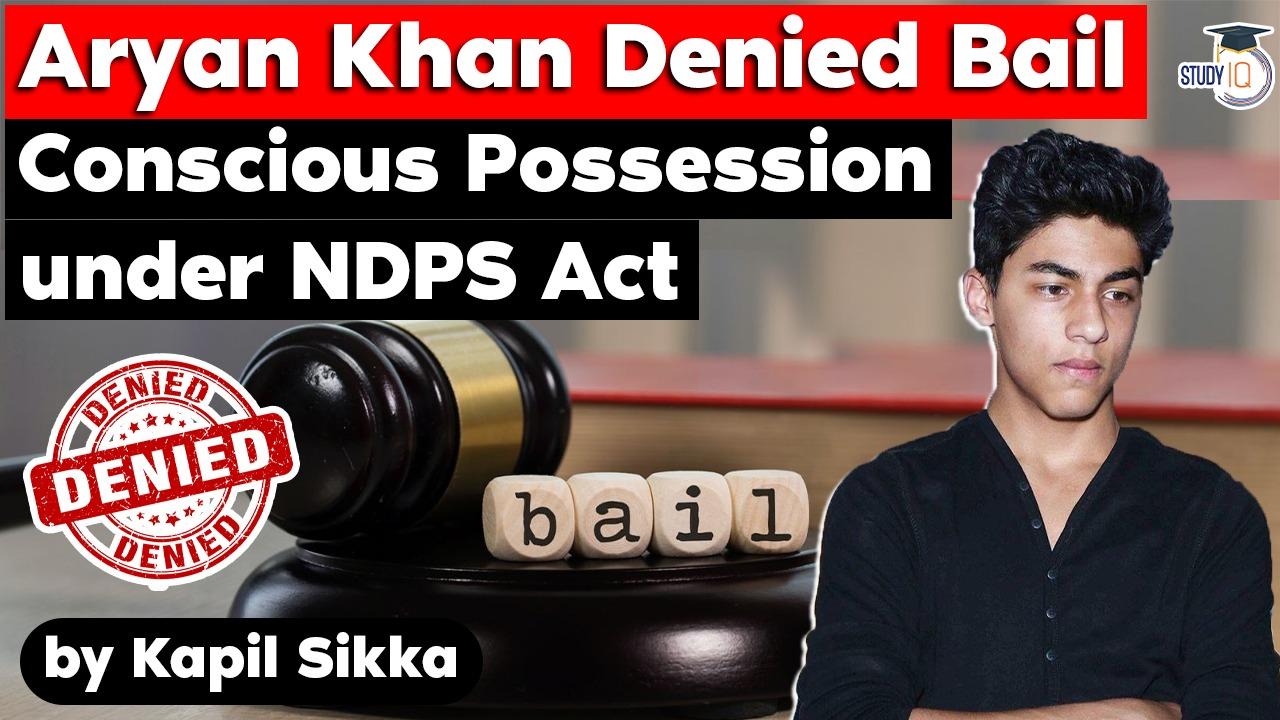Table of Contents
‘Conscious Possession’ Under NDPS Act:
- A Special NDPS Court has recently rejected the bail application of Aryan Khan by holding that even while Narcotics Control Bureau did not recover any drugs in his possession, he would not be entitled to bail as he was in “conscious possession” of the drugs found with Accused No.2- Arbaaz Merchant.
- The Special judge observed that Khan apparently knew his friend Abaaz Merchant was hiding charas (2.6 gms) for them to consume on the cruise, and therefore, it would amount to both of them being in conscious possession of the drugs.
- In the present case also though no contraband is found in possession of accused no. 1 (Aryan Khan), six grams of charas was found in possession of accused no. 2 (Arbaaz Merchant) which Khan was having knowledge, thus it can be said it was in conscious possession of both the accused,”
- Elaborating on the knowledge part, the order holds:” admittedly accused no.1 and accused no.2 are friends since long.
- They travelled together and they were apprehended together at the International Cruise Terminal.
- Further in their voluntary statements both of them disclosed that they were possessing said substance for their consumption and for enjoyment. Thus, all these things show that accused no.1 was having knowledge of the contraband concealed by accused no.1 in his shoes.“
- What does the term ‘conscious possession’ under the Narcotic Drugs and Psychotropic Substances Act mean and what is the test laid down to determine ‘conscious possession’?
CONSCIOUS POSSESSION UNDER THE NDPS ACT.
- The NDPS Act itself does not use the term ‘conscious possession’.
- Throughout the Act, the term possession occurs standalone without the term ‘conscious’ preceding it anywhere.
- The term has its origins in a plethora of Supreme Court and High Court judgements which have held that the term ‘possession’ under the NDPS Act must mean conscious or mental state of possession and not merely physical possession.
- example, if a delivery partner is caught delivering a package containing illegal drugs, he/she will not be held liable for the offence of possession unless it can be proven that there was mental awareness of the illegal drugs or- as the courts have put it- there was “conscious possession”.
- By specifying that possession must always be conscious in nature, court have laid down that ‘possession’ consists of two elements- one, the physical control and second the intent.
- Courts have drawn this element of mental state from S.35 of the NDPS Act which deals with the presumption of mental state of accused.
- In a 2015 case, a 2-judge bench of the Supreme Court in Mohan Lal v State of Rajasthan reiterated that “possession is a mental state and Section 35 of the Act gives statutory recognition to culpable mental state. It includes knowledge of fact.“
Supreme Court in Madan Lal v State of Himachal Pradesh
- where the court laid down that unless the possession is coupled with requisite mental element i.e conscious possession and not merely custody without awareness the nature of the possession
- In a 2010 case of Dharampal Singh v State of Punjab, the Supreme Court further explained the import of the term ‘conscious possession’.
- The court held that knowledge of possession of contraband has to be gleaned from the facts and circumstances of a case.
- The Court also explained the burden of proof required of the prosecution and the accused while considering the issue of ‘conscious possession’.
- The court held that- “the initial burden of proof of possession lies on the prosecution and once it is discharged legal burden would shift on accused.
- In the context of Section 18 of the Act once possession is established the accused, who claims that it was not a conscious possession has to establish it because it is within his special knowledge.”
In Sorabkhan Gandhkhan Pathan and another vs. State of Gujarat
- where the court acquitted a person who was merely travelling in an autorickshaw that was found to be used to transport illegal drugs.
- Similarly, in Avtar Singh v State of Punjab the vehicle loaded with bags of poppy husk was a truck and when it was stopped one person sitting in the cabin and another person sitting in the back of the truck fled away.
- The accused in the said case were not the only occupants and in the said background the Court held that they cannot be presumed to be in the possession of the goods.
- In case relied on by the Special NDPS Court to hold that the Aryan Khan was liable for conscious possession- Union Of India Through NCB vs Md. Nawaz Khan a 3-judge bench of the Supreme Court reiterated the governing principles laid down in Mohan Lal Case, Dharampal Singh Case, Madan Lal and Rattan Mallik.
- Making special reliance on the Rattan Mallik, the court held that finding of the absence of possession of the contraband on the person of the respondent by the High Court in the impugned order does not absolve it
- the test of ‘conscious possession’ depends on the independent facts and circumstances of each case.
- The prior relationship of the co-accused, the location where illegal drugs have been found, the behaviour of the accused, the quantity of the illegal substances recovered, etc are some of the relevant facts to be taken into consideration before the court
Latest Burning Issues | Free PDF






















 WhatsApp
WhatsApp